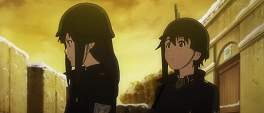Something happens at episode seven of Sora no Woto: what seemed like a placid mongrel dog suddenly bared its teeth. Brief and unexpected, it gives the animal a presence it hid so well previously. Rarely does it show them again and in the series' brief run of twelve episodes the dog remains serene and predictable - the bite never comes despite ample opportunity. Contrary to earlier predictions based upon the first three episodes, the series meanders but never succumbs to the obvious and though it may leave more loose threads than is justifiable it most importantly has a heart, a feature lacking in so many other series.
In the distant past, a disaster befell the Earth and much of the knowledge of technology was lost along with much of population and fauna. After joining the Helvetian army as a bugler and assigned to the 1121st Platoon, Kanata must adjust to the slow paced lifestyle of the remote border town of Seize and her comrade's idiosyncrasies, all while improving her bugling skills. Her misadventures include the exploration of a haunted, ramshackle school, an impromptu training exercise as well as rescuing children from a vicious typhoon. Her squad mates include the precocious Kureha, the solemn technical genius Noel, the big sister Rio and their whimsical leader Filicia; over the course of the series they rebuild of the multipedal tank: Takemikazuchi while their pasts are revealed and motivations explored.
Sora no Woto starts as a quaint facsimile of a European town and swiftly becomes a cosmopolitan mish-mash of different styles and influences: the Japanese speaking girls wear German uniforms and live in a Spanish town in a country whose name is synonymous with Switzerland and play Amazing Grace - written by an English poet - and encounter the enemy who speak German and come from Rome. It's not without precedence for a series to cherry pick individual elements of a country's persona but to create such a Frankenstein's monster of an amalgamation deserves credit. The situation is canonically explained as a technological regression and obviously the loss of regional delineations. It could have been left at that, the series explores a little further: the festivals Kanata enjoyed in her home town are subtly altered in Seize just as the religious parables of the Fire Maidens are different when told in Rome as opposed to Helvetia; this indirect expansion of the back story adds a pleasant depth but is ultimately rendered superfluous by a refusal to tie off the plethora of story threads.
Beginning with Kanata's vision of a submerged skeleton, the legend of the Fire Maidens and an Angel are often alluded to but never explored in detail - mirrored by many of the character's interactions. Rio is particularly afflicted with these: sharing an unspoken relationship with many in the town, the local priestess Yumina a prime example, but with no explanation as to why - for example - they no longer speak. As soon as one thread is picked free, others quickly follow: an elderly woman is introduced and unceremoniously removed in a single episode, Kanata hints as to how she knows of the illegal bootlegging operation but never explains, Noel's connection to Aisha, Kureha's status as an orphan... In a wholly uncharacteristic fashion various strands are introduced via teases and inferences but are spoiled by how few are ever completed. Even with the episodic nature, the series is still burdened with a lamentably open-ended climax.
The juxtaposition of the darker blood-strewn histories with the sunny spring-time frolics is strangely endearing. The post-apocalyptic undertones never become bleak or overbearing just as the "girls with instruments" seed never strangles the characters - Kanata's initial desire to learn the bugle is wrapped up a third of the way in and rarely brought up again. The series takes great pains to avoid obviousness, even when a story unfolds predictably the concluding event is obviated entirely or the focus is elsewhere: it is a given that Kanata would use her keen hearing to choose the lens produced at the local glassworks, just as the anticipation for this fact to dawn on the characters becomes tiresome it is brushed away and relegated to a brief footnote. If there is one constant however, it is that gutsy happiness will prevail over all else; no more is this obvious than in the conclusion where, in true Macross style, a war is stopped with the melody from a single girl and a princess returns to her humble roots. The story may be peppered with misfortune and tribulation but the series' stoic pleasantness prevails.
The visuals round out the grab bag of different foibles the series demonstrates with basic, frequently scrappy characters set against some breathtakingly sublime backgrounds. Obviously influenced by the peculiarly successful K-On!, the characters there came to life with superb gestures and expressions, not so here. Facial features are wont to wander and only the unflattering military garb prevents the same happening to limbs and other body parts. Given A1-Pictures pedigree this is not unsurprising and the best that can be said of the characters is that they are consistently rather than only occasionally poorly rendered. As the title infers, music plays a key role in the series and the signature song, Amazing Grace, is routinely stirring and given a gravity befitting its heritage. Kalafina's opening is supremely fitting for the tone of the series and the Gankutsuou style aesthetics are repeated for the infrequent Fire Maiden stories; unfortunately the ending is so gratingly cheerful that it often destroys the mood so carefully orchestrated by the episode and is sure to stick in one's head long after the show has concluded.
Sora no Woto is a series of dichotomies and ambivalence. For every stirring, touching or emotional moment of atmospheric music and painterly backgrounds, there is a saccharinely twee bonanza of child-like blue skies and nonsense. Whether one can push past the incessantly wandering plots and appreciate the emotionally affecting heart will be tantamount to their enjoyment of the series. Were it not so initially focused on pandering to as wide an audience as possible this could have equally been an enjoyable, if not stylistically confused, look at the small-town life of soldiers or a dark exploration of the effects of a war of attrition on a planet already marred by conflict. Instead there is a mixture of both with the benefits of neither, oscillating between merely good and encroaching mediocrity; this mongrel may have the blood of greats in its lineage but its refusal to bear its teeth is its downfall.












Even the atmosphere - that of a dying world and humanity in its violent twilight would have been better for it, but the K-On! vibe seems to have spread beyond just the character stylings.
A sequel certainly wouldn't go amiss but I wonder whether it has been popular or financially viable enough to warrant one.